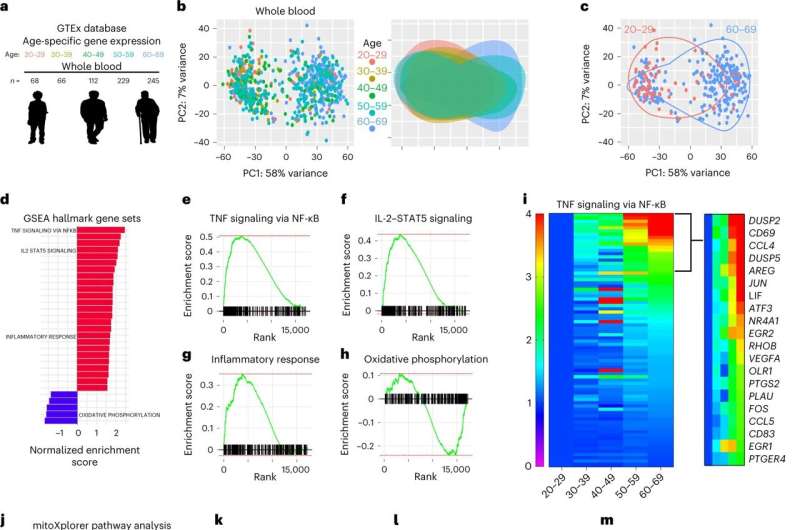This article has been reviewed according to Science X's editorial process and policies. Editors have highlighted the following attributes while ensuring the content's credibility:
fact-checked
peer-reviewed publication
trusted source
proofread
Inflammation discovery could slow aging, prevent age-related diseases

University of Virginia School of Medicine researchers have discovered a key driver of chronic inflammation that accelerates aging, a finding that could lead to longer, healthier lives and the possible prevention of age-related conditions such as deadly heart disease and devastating brain disorders.
The harmful inflammation is driven by improper calcium signaling in the mitochondria of certain immune cells, researchers found. Mitochondria are the power generators in all cells, and they rely heavily on calcium signaling.
The UVA Health researchers, led by Bimal N. Desai, found that, as we age, mitochondria in immune cells called macrophages lose their ability to take up and use calcium. This leads to chronic inflammation responsible for many of the ailments that afflict our later years.
The researchers believe that increasing calcium uptake by the mitochondrial macrophages could prevent the inflammation and its terrible effects. Because macrophages reside in all of the body's organs, including the brain, targeting them with appropriate drugs may help slow age-associated neurodegenerative diseases.
"I think we have made a key conceptual breakthrough in understanding the molecular underpinnings of age-associated inflammation," said Desai, of UVA's Department of Pharmacology and UVA's Carter Immunology Center.
Desai said the discovery provides potential treatment strategies to head off inflammatory cascades that lie at the heart of many cardiometabolic and neurodegenerative diseases.
The findings are published in the journal Nature Aging.
The inflammation of aging—'inflammaging'
Macrophages are white blood cells that play critical roles in the immune system and good health. They swallow up dead or dying cells, allowing the removal of cellular debris, and they patrol for pathogens and other foreign invaders. In this latter role, they act as important sentries for the immune system, calling for help from other immune cells as needed
Scientists have known that macrophages become less effective with age, but it has been unclear why. Desai's new discovery suggests answers.
Desai and his team say their research has identified a "keystone" mechanism responsible for age-related changes in the macrophages. These changes, the scientists believe, make the macrophages prone to chronic, low-grade inflammation at the best of times. And when the immune cells are confronted by an invader or tissue damage, they can become hyperactive. This drives what is known as "inflammaging"—chronic inflammation that drives aging.
Further, the UVA Health scientists suspect that the mechanism they have discovered will hold true not just for macrophages, but for many other related immune cells generated in the bone marrow. That means we may be able to stimulate the proper functioning of those cells as well, potentially giving our immune systems a big boost in old age, when we become more susceptible to disease.
Next steps
Fixing inflammaging won't be as simple as taking a calcium supplement. The problem isn't a shortage of calcium so much as the macrophages' inability to use it properly. But Desai's new discovery has pinpointed the precise molecular machinery involved in this process, so researchers should be able to discover ways to stimulate this machinery in aging cells.
Desai said the interdisciplinary research effort—which combined computational biology, immunology, cell biology and biophysics—wouldn't have been possible without the determination of Phil Seegren, the graduate student who spearheaded this ambitious project.
"Now, moving forward, we need an equally ambitious effort to figure out the wiring that controls this mitochondrial process in different types of macrophages and then manipulate that wiring in creative ways for biomedical impact," Desai said.
More information: Philip V. Seegren et al, Reduced mitochondrial calcium uptake in macrophages is a major driver of inflammaging, Nature Aging (2023). DOI: 10.1038/s43587-023-00436-8





















